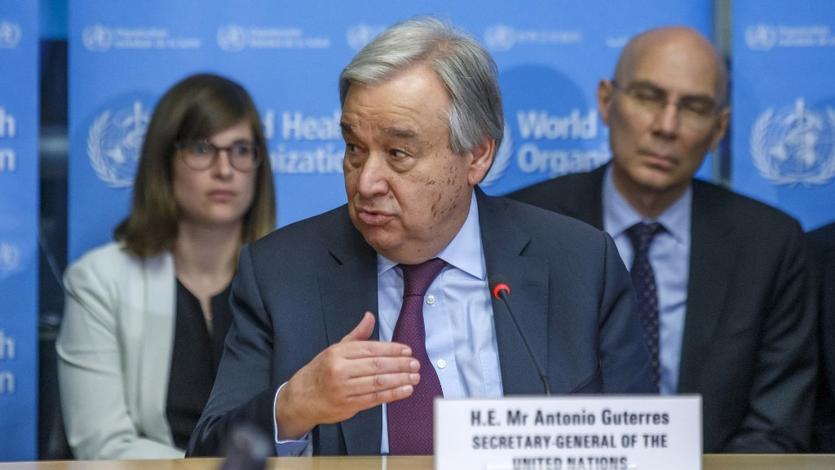 In this file photo taken on Feb 24, 2020 UN Secretary-General Antonio Guterres speaks during an update on the situation regarding the COVID-19 in the SHOC room (Strategic health operations centre) at the World Health Organization (WHO) headquarters in Geneva. (SALVATORE DI NOLFI / POOL / AFP)
In this file photo taken on Feb 24, 2020 UN Secretary-General Antonio Guterres speaks during an update on the situation regarding the COVID-19 in the SHOC room (Strategic health operations centre) at the World Health Organization (WHO) headquarters in Geneva. (SALVATORE DI NOLFI / POOL / AFP)
UNITED NATIONS - UN Secretary-General Antonio Guterres on Monday called for an immediate global cease-fire in face of the novel coronavirus disease (COVID-19).
"It is time to put armed conflict on lockdown and focus together on the true fight of our lives (against the coronavirus)," he said in a virtual press encounter.
A global cease-fire is crucial to help create corridors for life-saving aid, to open precious windows for diplomacy, and to bring hope to places among the most vulnerable to COVID-19, he said
He asked warring parties to pull back from hostilities, put aside mistrust and animosity, and silence the guns.
A global cease-fire is crucial to help create corridors for life-saving aid, to open precious windows for diplomacy, and to bring hope to places among the most vulnerable to COVID-19, he said.
READ MORE: UN to create global coronavirus fund, Norway says
"Let us take inspiration from coalitions and dialogue slowly taking shape among rival parties in some parts (of the world) to enable joint approaches to COVID-19. But we need much more: end the sickness of war and fight the disease that is ravaging our world," he said. "It starts by stopping the fighting everywhere, now. That is what our human family needs, now more than ever."
COVID-19 is a common enemy to the world. The virus does not care about nationality or ethnicity, faction or faith. It attacks all relentlessly, said Guterres.
Meanwhile, armed conflict rages on around the world. The most vulnerable -- women and children, people with disabilities, the marginalized and the displaced -- pay the highest price. They are also at the highest risk of suffering devastating losses from COVID-19, he said.
"Let's not forget that in war-ravaged countries, health systems have collapsed. Health professionals, already few in number, have often been targeted. Refugees and others displaced by violent conflict are doubly vulnerable," he noted. "The fury of the virus illustrates the folly of war."
ALSO READ: UN chief: We will get through the pandemic together
Guterres said he has directed his special representatives to engage with local governments "to create a global dynamic" in order for all countries to put pressure on all warring parties to stop fighting.
"My special envoys will be now working with the parties to the conflict to try to make sure that this global appeal is not only listened to but leads to concrete action, leads to a pause in fighting, creating the conditions for the response to COVID-19 to be much more effective."
The virus does not care about nationality or ethnicity, faction or faith. It attacks all relentlessly, said Guterres
He noted that war-ravaged areas are those where the capacity of response is very limited. "If the fighting goes on, we might have an absolutely devastating spreading of the epidemic."
The UN Refugee Agency (UNHCR) and the International Organization for Migration have been working hard to have a plan in order to create conditions in facilities housing refugees and displaced people to prevent the arrival of the virus and to create the capacity to respond and to mitigate the impact inside those facilities, he said.
Guterres asked the international community to fully support those measures.
He reaffirmed the world body's determination to lead.
This is the moment in which the United Nations must be active. The UN must fully assume its responsibilities, first doing what it has to do: peacekeeping, humanitarian assistance, support to the different bodies of the international community, the Security Council, the General Assembly, he said.
At the same time, the United Nations must be able to address the concerns of the peoples of the world and appeal for a massive mobilization and for a massive pressure on governments to suppress the disease and to address the dramatic economic and social impacts.
If the fighting goes on, we might have an absolutely devastating spreading of the epidemic
Antonio Guterres, UN secretary-general
Guterres called for stronger coordination among member states. "I think it is clear that we need much stronger coordination, coordination in suppression of the disease, coordination in making sure that not only the developed countries can respond effectively to the disease but that there is massive support to the developing world (in order) not to let the disease spread like wildfire in the developing world."
He also stressed the need for "a huge package" to respond to the economic and social consequences.
Such a package should not be aimed at the financial center, like in the 2008 financial crisis. The package needs to keep households, businesses and societies afloat in these very difficult circumstances, he said.
"We need to mobilize in our funds to allow the developing countries themselves to be able to have an adequate economic and social response to the crisis and then the need to make sure that, when we recover, we recover in a more sustainable and a more inclusive economy."
Guterres said he has just sent a letter to leaders of the Group of 20 largest economies in the world. Before the letter, he had already spoken with several of them.
The UN chief said he intended to be in a virtual conference with all of them this week.
"And we can only do it if we do it together, if we do in a coordinated way, if we do it with intense solidarity and cooperation. And that is the raison d'etre of the United Nations itself."


